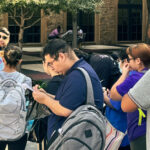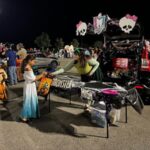By Daniel Serna
In Feb. 1944, Anna Rado, a seventh-grade school girl celebrated her 13th birthday. One month later, her world would be horrifically turned upside down. Rado’s story is not only one of survival but resilience, hope and faith.
Rado, 85, visited Texas A&M University-San Antonio for the fifth annual Holocaust Remembrance Day, and spoke candidly with the audience about her experiences during the Holocaust.
Holocaust Remembrance Day was presented by the National History Honors Society, Phi Alpha Theta, and history professor, Dr. Edward Westermann.
Rado’s Holocaust story begins in 1944 when Nazi Germany stormed into her small town, Rajka in Hungary, and took control of the 300 Jewish people living there.
“Everything changed for the Jewish people in Hungary in 1944, March 19, when the Germans invaded Hungary,” Rado said. “Right away, the next day we had to wear a yellow star that remarked that you were Jewish.”
Rado and her family were forced into two ghettos before being shipped via a crowded train for three days to the concentration camp Auschwitz-Birkenau.
They were torn apart when they arrived at Auschwitz-Birkenau. That was the worst part of her survival during the Holocaust.
“…I lost my parents without even saying goodbye,” she said.
Rado advised how important it is to hug and tell parents or loved ones how much you love them because she never got a last chance to say goodbye to her parents.
Over one million people died in the Auschwitz concentration camp. Most of those murdered were Jewish.
“And then there was this funny smell in the air, the crematoriums,” Rado said. “We later found out that that’s where they [Nazi Germans] killed my parents. We never thought there is so much hatred, and it was…it was, very, very hard to understand what’s happening.”
Georgenthal was the last concentration camp where Rado would be a prisoner.
On May 9, 1945, the war ended.
Even after struggling for survival and seeing cruel and heinous crimes happening in front of her, she still held her faith in God.
“I never blamed God, what’s happening to me, it was people who did that to us,” Rado said. “You cannot forget whatever happens to you, but you have to keep on going because life is not always easy.”
When the war was over, only 15 of the 300 Jewish people from Rajka returned.
As Rado’s story about her Holocaust survival came to end, she expressed how fortunate she is to be alive to tell her story to interested people.
“With all the hardship I went through, I still feel blessed that I can stay in front of you and tell you my story,” Rado said. “As long as people will be interested in our story, we will, as hard as it, we will tell.”
Westermann assured Rado that her story will continue.
“My promise to Anna is, and our promise for the class is, that when she’s gone we will be her witnesses, and so that is a pledge we make to you, Anna,” Westermann said.
Rado’s main message of her struggle and survival during the Holocaust is that with faith and hope anyone can overcome tribulations.
“If you are in a hardship, you just have to go on and believe in God and tomorrow will be better,” Rado said.
For more information on Rado’s story and other San Antonio Holocaust survivors please visit the Holocaust Memorial Museum of San Antonio.






